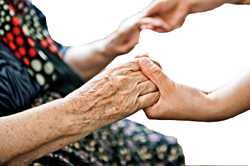4.2 Elderly
 The elderly are more prone to the adverse effects of benzodiazepines because of:
The elderly are more prone to the adverse effects of benzodiazepines because of:
Reduced capacity to metabolise benzodiazepines as well as reduced renal excretion. This may result in accumulation of the drug.
Increased sensitivity to the effects of benzodiazepines (unrelated to pharmacokinetic changes). In particular, the elderly are at greater risk of:
Memory impairment
Impaired cognitive function
Poor psychomotor1 performance
Falls, which might result in injury, such as hip fracture
Behaviour disinhibition2—often manifesting as irritability and argumentativeness It is likely that many long-term users of benzodiazepines are elderly.
Factors which increase risk
Frailty increases the risk of harm from benzodiazepine adverse effects; in addition to weakness, reduced function of various body organs and systems can further contribute to complications.
Many elderly people receive several medicines (‘polypharmacy’); this raises the potential for interaction with benzodiazepines, thereby increasing the risk of excessive sedation, respiratory and cardiovascular impairment, and mental effects such as confusion.
Risk-reduction measures
Having established that a benzodiazepine is essential for treatment, the initial dose in the elderly should generally be half the usual adult dose.
A short-acting benzodiazepine should be chosen for the elderly to reduce the possibility of accumulation and consequent side effects.
With support and encouragement, it may be possible to help elderly long-term users of benzodiazepines to come off them and benefit from reversal of reduced mental acuity and memory.